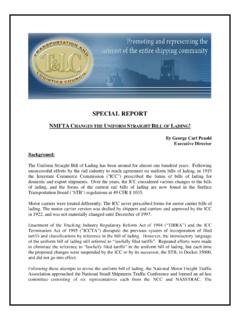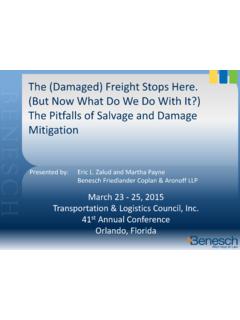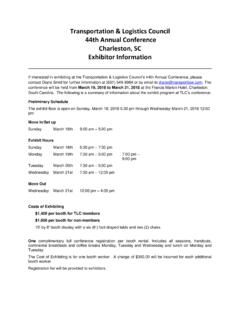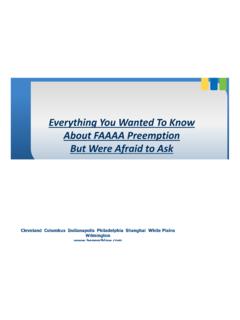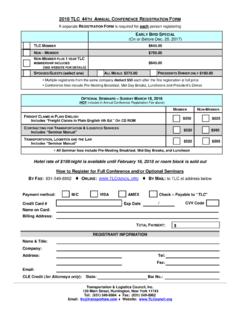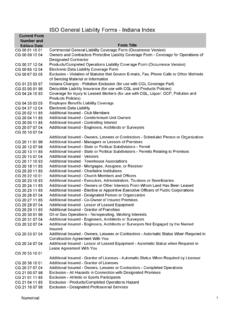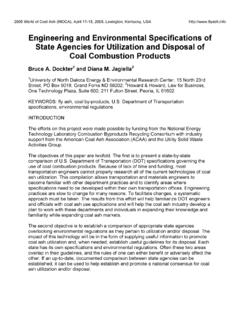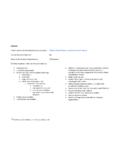Transcription of ANTI-INDEMNITY CLAUSES IN TRANSPORTATION …
1 ANTI-INDEMNITY CLAUSES IN TRANSPORTATION CONTRACTS By George Carl Pezold In view of their concern about vicarious liability for trucking accidents and the uncertainty over their carrier selection obligations under the Federal Carrier Safety Administration s ( FMCSA ) Compliance, Safety, Accountability ( CSA ) and Safety Management System ( SMC ), many shippers have been including broad indemnity CLAUSES in their TRANSPORTATION contracts. Some of these contract provisions essentially try to make the carrier indemnify the shipper even when the shipper s negligence may have caused or contributed to the accident or injury. As a result, state trucking associations, as part of a program initiated by the American Trucking Associations ( ATA ) have lobbied their state legislatures to enact what is referred to as the ATA s anti -Indemnification Bill dealing with such indemnity CLAUSES .
2 A recent example is legislation that was introduced in Michigan that reads as follows: (1) A provision, clause, covenant, or agreement contained in, collateral to, or affecting a motor carrier TRANSPORTATION contract that purports to indemnify, defend, or hold harmless, or has the effect of indemnifying, defending, or holding harmless, the promisee [shipper] from or against any liability for loss or damage resulting from the negligence or intentional acts or omissions of the promisee [shipper] is against the public policy of this state and is void and unenforceable. (2) This section does not apply to the uniform intermodal interchange and facilities access agreement administered by the Intermodal Association of North America or other agreements providing for the interchange, use, or possession of intermodal chassis or other intermodal equipment.
3 (3) As used in this section: (A) motor carrier TRANSPORTATION contract means a contract , agreement, or understanding for any of the following: (i) the TRANSPORTATION of property for compensation or hire by a motor carrier. (ii) Entrance on property by a motor carrier for the purpose of loading, unloading, or transporting property for compensation or hire. (iii) A service incidental to activity described in subparagraphs (i) and (ii), including, but not limited to, the storage of property. (B) promisee means a party to a motor carrier TRANSPORTATION contract who is not a motor carrier or, if the promisee is a motor carrier, a party to a motor carrier TRANSPORTATION contract who is not transporting property for compensation or hire.
4 Promisee includes agents, employees, servants, and independent contractors who are directly responsible to the promisee. The legislative memorandum in support of the Michigan legislation cites two examples as to why the carrier should not be required to indemnify the shipper: (1) improper loading by the shipper that is not detectable by ordinary observation (such as a shipper load & count ( SL&C ) or sealed trailer) that causes or contributes to an accident, and (2) failure to notify the carrier of the presence of hazardous materials so that the carrier would be unable to provide adequate information to emergency responders in event of an accident or spill. The so-called anti -indemnification statutes, which have been prevalent in the construction industry for many years, are being enacted by more and more states in connection with shipper-carrier TRANSPORTATION contracts.
5 Other states that have passed similar legislation invalidating certain indemnification provisions include Maryland, Oklahoma, Illinois, Indiana, Missouri, Kansas, Nebraska, New Mexico, North Carolina, South Carolina, North Dakota, Tennessee, Texas, Virginia, West Virginia and Wyoming. These anti -indemnification statutes do not, as the name suggests, prohibit indemnification provisions altogether. Rather, the purpose is to prohibit indemnification provisions requiring the carrier to indemnify the shipper for accidents, injuries, claims or damages that are caused by the negligent or wrongful acts of the shipper. In other words, these statutes do not prohibit an indemnification provision requiring the carrier to indemnify the shipper for negligent or wrongful acts of the carrier.
6 The most commonly cited example is where the shipper is sued along with the carrier because of a truck accident caused by some mechanical problem with the truck, such as faulty brakes, or the truck driver was under the influence of alcohol or drugs. In this example, where the carrier is clearly the negligent party, the anti -indemnification statute should have no bearing on the application of an indemnification provision within the TRANSPORTATION contact. An interesting side note to consider is whether the states even have the authority to enact anti -indemnification statutes, because such statutes may be preempted under federal law. In particular, under 49 14501 no state may enact or enforce a law, regulation or other provision have the force and effect of law related to price, route, or service of any motor carrier, broker or freight forwarder with respect to the TRANSPORTATION of property.
7 This preemption statute has been broadly interpreted by various courts to find most state laws are preempted ( , unenforceable). Although we are unaware if anyone has challenged a state anti -indemnification law on grounds of federal preemption, it certainly raises in an interesting question. While the motive behind this anti -Indemnification Bill may seem reasonable, shippers should be very careful to have their contracts reviewed by a competent TRANSPORTATION attorney. A poorly drafted indemnity clause could be found to be null and void , leaving the shipper with no protection at all. George Carl Pezold Pezold, Smith, Hirschmann & Selvaggio, LLC 120 Main Street, Huntington NY 11743 (631) 427-0100
